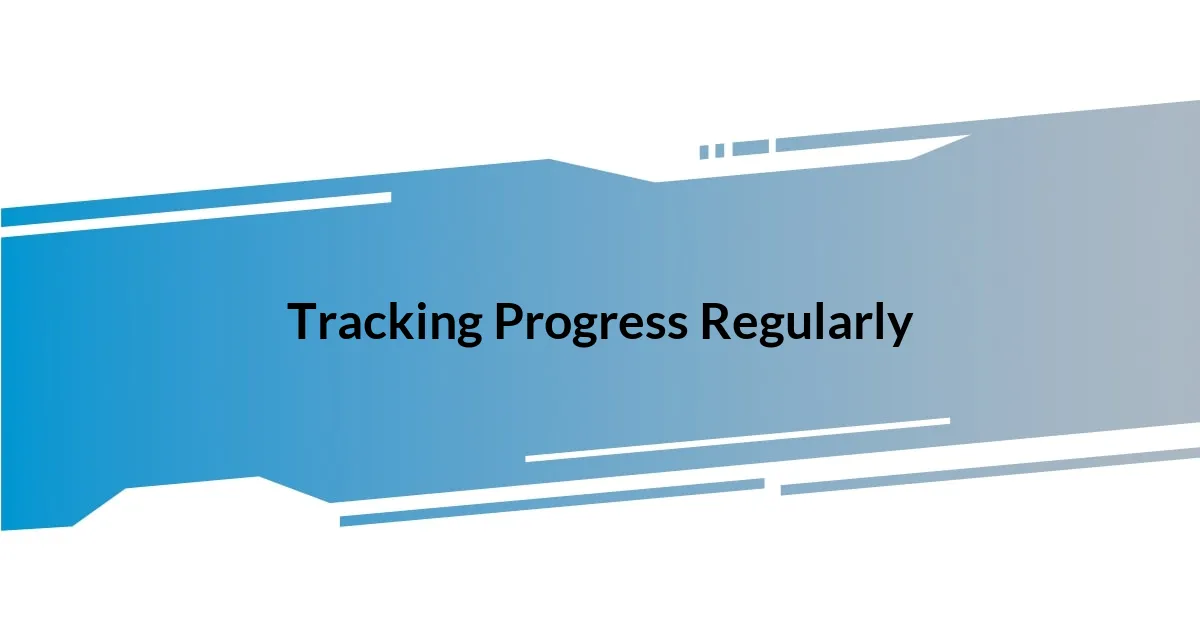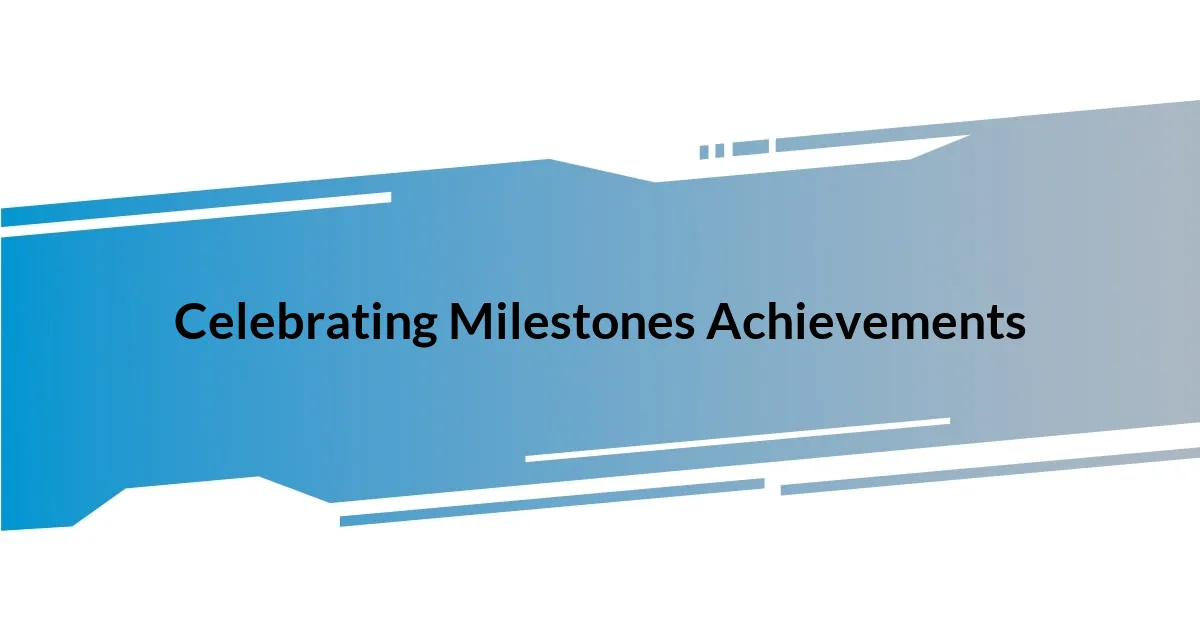Key takeaways:
- Setting SMART goals (Specific, Measurable, Achievable, Relevant, Time-bound) eliminates vagueness and clarifies objectives.
- Identifying personal motivations and aligning goals with core values leads to greater fulfillment and commitment.
- Breaking goals into manageable steps creates a sense of progress and boosts confidence, making large tasks less daunting.
- Regularly tracking progress and celebrating milestones enhances motivation and acknowledges achievements, reinforcing positive behavior.

Setting SMART Goals
When I first learned about SMART goals, it truly changed my perspective on planning. The acronym stands for Specific, Measurable, Achievable, Relevant, and Time-bound. Each part serves as a guide, allowing me to narrow down my objectives—like when I wanted to improve my writing; instead of just saying “I want to write more,” I specified, “I will write three blog posts per week.”
Using these criteria helps eliminate vagueness. For instance, when setting a fitness goal, I used to just aim for “getting in shape.” But by refining it to “I’ll run a 5K in under 30 minutes within three months,” I created a clear blueprint. Have you ever had that moment where a goal seemed overwhelming until you broke it down into simpler parts? I felt a huge sense of relief once I did that; it made the path forward much clearer.
Another aspect I value is the relevance of the goal. If it’s not significant to my life or aspirations, I find it hard to stay motivated. A few years back, I realized I was pursuing a certification that didn’t align with my career goals. Stepping back, I asked myself why I was chasing it. Connecting my goals to my authentic aspirations keeps me engaged and passionate. How do you ensure that your goals resonate with your personal vision?

Identifying Personal Motivations
Identifying what truly drives me is paramount in my goal-setting journey. I often reflect on past experiences to uncover my personal motivations. For instance, when I was considering a career shift, I revisited moments when I felt most fulfilled. I discovered that helping others always sparked joy in me. This realization redirected my focus towards goals that would involve positively impacting others while pursuing my passions.
Do you ever feel overwhelmed by options? I’ve been there. During my quest for motivation, I realized that some goals felt empty, even if they were prestigious. For example, I chased after a promotion for the title’s sake, but it left me feeling unfulfilled. It taught me the importance of aligning my goals with my core values. This alignment transforms a simple checklist into a fulfilling journey toward something bigger.
To really ensure my goals are rooted in personal motivation, I create a table summarizing my strengths, values, and interests contrasted against external pressures or expectations. This practice allows me to visually distinguish where my true motivations lie, making it easier to pursue what genuinely matters to me.
| Personal Motivations | External Pressures |
|---|---|
| Fulfillment in helping others | Societal expectations of success |
| Passionate about writing | Peer pressure to pursue high-paying jobs |
| Value personal growth | Family’s desire for traditional career paths |

Breaking Goals into Steps
When I started breaking my goals into manageable steps, it was like turning a daunting mountain into a series of small hills. I recall aiming to write a book, which felt overwhelmingly ambitious. Instead of getting bogged down by the enormity of the task, I set aside specific word counts for each day, allowing me to focus on progress rather than perfection. By viewing my larger aspirations as a series of smaller, actionable tasks, I found that each completed step boosted my confidence and momentum.
Here are some practical steps I often follow:
- Define the main goal: Clearly articulate what you want to achieve.
- Identify key milestones: Break the goal into significant markers, e.g., outlining chapters if writing a book.
- Create daily or weekly tasks: Assign specific actions—like writing a certain number of pages—leading up to each milestone.
- Review progress regularly: Assess how far you’ve come and adjust your plan as necessary.
- Celebrate small wins: Acknowledge and savor each completed step to stay motivated.
I’ve learned that every little achievement creates a ripple effect, pushing me closer to my ultimate goal. While focusing on the journey rather than just the destination has been a game changer, it also allows me to remain adaptable. Life has a way of throwing curveballs, and being flexible with my steps helps me navigate those twists with greater ease.

Tracking Progress Regularly
Tracking my progress regularly has become one of the cornerstones in my goal-setting strategy. Whenever I make strides, no matter how small, I jot them down in a journal. This practice not only keeps me accountable but also reveals patterns—like discovering that I tend to be most productive in the mornings. Have you ever noticed how certain times of day affect your energy? It’s fascinating how consistent tracking can unveil these insights.
I remember back when I was trying to shift my fitness routine. At first, I didn’t think much of logging my workouts; I was simply trying to get through them. But once I started tracking my progress weekly, I could see how far I’d come—weights lifted, distances ran, or even just my mood after a workout. It lit a fire in me! Each tiny improvement felt like a victory, encouraging me to push harder. Isn’t it amazing how motivation can be sparked by simply recognizing progress?
To keep my tracking meaningful, I use a mix of digital tools and good old-fashioned paper. There’s something about physically writing down achievements that feels rewarding. I highlight key milestones, and during my monthly reviews, I reflect on what worked and what didn’t. This not only tracks my journey but also serves as a checkpoint, helping me pivot strategies if necessary. Have you thought about how a simple adjustment in your tracking method could change your outlook? For me, it transformed a daunting experience into a celebration of progress—and that’s something I cherish deeply.

Adjusting Goals as Necessary
Adjusting my goals when circumstances change has become crucial for me. I’ve been there—setting a goal, feeling excited, and then suddenly life takes an unexpected turn. For instance, when I was deep into a writing project, I faced a personal challenge that required my attention. Instead of stubbornly pushing through, I paused to reassess my timelines. This adjustment relieved some pressure and ultimately helped me maintain my focus on quality.
I often ask myself, “What happens if I don’t adapt my goals?” The answer is usually stress and frustration, like trying to fit a square peg into a round hole. I remember when I was training for a marathon, but an injury sidelined me for weeks. Instead of sulking about it, I reevaluated my training schedule, shifting my focus toward rehab exercises and cross-training. This new approach not only aided my recovery but also added depth to my running journey, keeping my motivation alive.
It’s about being proactive, right? I’ve learned that adjusting goals isn’t a sign of failure; it’s a sign of resilience. When I tweak my objectives, I feel a sense of empowerment, knowing I’m in control of my path. Have you ever felt the weight lift off your shoulders after rethinking a goal? For me, each adjustment feels like a breath of fresh air, reminding me that growth often comes from flexibility and openness to change.

Celebrating Milestones Achievements
Celebrating milestones is crucial in maintaining motivation and acknowledging progress. I’ve discovered that taking a moment to recognize achievements, big or small, can transform my mental landscape. For instance, when I completed my first month of consistent gym workouts, I treated myself to a nice dinner. That small celebration made all the hard work feel worthwhile. Have you ever rewarded yourself for a job well done? It really reinforces the idea that progress deserves recognition.
During a project I worked on recently, I hit a particularly challenging milestone—finalizing a draft after weeks of struggle. Instead of rushing to the next task, I decided to spend a weekend outdoors to recharge. Reflecting on that achievement while enjoying nature reminded me how important it is to celebrate these moments. I often find that giving myself permission to pause and celebrate fosters a greater sense of accomplishment. How often do you allow yourself that space?
Additionally, I incorporate visual reminders of my milestones, like a vision board or a dedicated section in my journal. For example, after completing an online course, I added my certificate to the board. Each time I walk past it, I can’t help but smile and feel inspired. It acts as a motivational tool, reminding me of what I’ve accomplished and propelling me toward my next goal. Have you considered using visual cues to mark your achievements? Trust me, they can make a powerful impact on your journey.

Overcoming Common Goal Challenges
Sometimes, the path to achieving my goals feels like navigating a maze with unexpected twists and turns, especially when facing self-doubt. I vividly recall a time when I launched a new project and was met with overwhelming feelings of inadequacy. Instead of letting those thoughts spiral, I reached out to a friend for support. That simple act reminded me that seeking help is a strength, not a weakness—kind of like having a lifeline in a storm.
Another hurdle I encounter regularly involves creating too many goals at once. I’ve learned that overloading myself can lead to burnout—a lesson I faced head-on while trying to juggle several side projects. To combat this, I now prioritize my goals by focusing on a few key targets. When I streamlined my efforts, I noticed a beautiful shift; my productivity soared, and I began to savor each success. Have you ever felt bogged down by trying to do too much? Simplifying my approach was a game changer.
Procrastination is another sneaky adversary that often creeps in. I remember a time when I delayed starting a passion project because the end results felt daunting. It was only after I broke down the task into smaller, manageable steps that I gained momentum. Once I completed the first step, excitement took over! I realized that taking that initial leap is often the hardest part. What pushes you to break through that inertia? For me, it’s embracing imperfection and recognizing that progress, however small, is still progress.